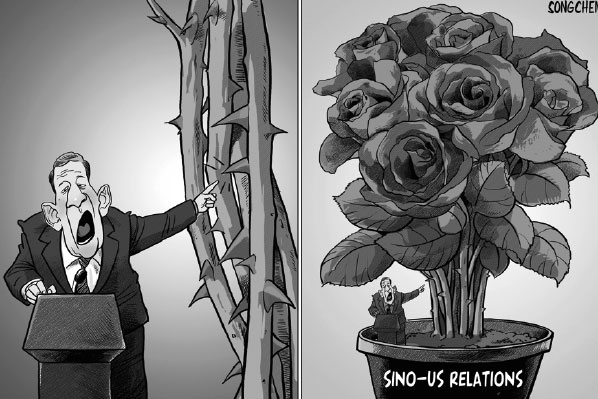
A Pew Research Center survey released on Wednesday is a cause for concern, especially as it comes ahead of President Xi Jinping's state visit to the United States. It shows that 54 percent of Americans have an unfavorable opinion of China, while just 38 percent view it favorably. The negative rating of China among Americans is even worse than what it was in 2008 - 42 percent.
The major problems American citizens see in the Beijing-Washington relationship include the huge US debt held by China, the loss of US jobs to China, alleged cyberattacks from China, China's human rights policies, US trade deficit with China as well as China's impact on the global environment, its growing military power, and the tension between the Chinese mainland and Taiwan.
The Pew Research Center survey is not surprising because the issues mentioned above have become the talking points of US politicians and the media in recent years, and shows how powerful politicians and the media are in shaping public opinion.
It is true that China, as the world's largest developing country, has some room for improvement in fields such as environmental protection and safeguarding human rights.
But more Americans' voicing concern over the debt held by China than anything else sounds absurd. Should Americans be happy knowing that China dumped nearly $100 billion US Treasury bonds in August, making itself a smaller creditor of the US?
The concern over loss of US jobs to China, too, is absurd. Over the years, researchers such as Andrew McAfee, of Massachusetts Institute of Technology and author of Race Against the Machine, have found technology is responsible for the loss of most jobs. And two years ago, researchers at Oxford University found that 45 percent of the US' occupations would be automated within the next 20 years.
As for the US trade deficit with China, the figure is quite misleading. Economist Zachary Karabell, for example, has said Apple's iPhone sales in the US alone were adding $6 billion to $8 billion a year to the trade deficit because each iPhone that Apple sells in the US increases the deficit by about $200. The reason: they are assembled in China. On the other hand, the Asian Development Bank estimates that less than $10 per iPhone or iPad ends up in the Chinese economy.
As a journalist, I understand the role of news media as a watchdog. But the fact is, the public, which depends on news media for information, may not be well or correctly informed about the big picture.
When asked whether China-US ties have been hijacked by cyber-hacking and South China Sea issues, former US ambassador to China Stapleton Roy, a highly respected China hand, bluntly said the issues have been hijacked by the media. Indeed, they are important issues, but many other important issues have not received much media attention. A similar example is the US media's excessive coverage of billionaire presidential candidate Donald Trump while neglecting serious and rational debates on key issues facing the US and the world.
Polls mean a lot to US politicians. But the latest Pew Research Center poll result on China could be the outcome of surveying not-so-well-informed people. Since most US congressmen and presidential candidates don't have much knowledge about China, how can one expect average American citizens to be well informed about China?
These facts mean the two countries' top leaders, Xi and Barack Obama, will have a major task on hand when they meet later this month: to present their citizens the big picture of China-US relations. That is no less urgent than tackling the cybersecurity and South China Sea issues.
The author, based in Washington, is deputy editor of China Daily USA. chenweihua@chinadailyusa.com